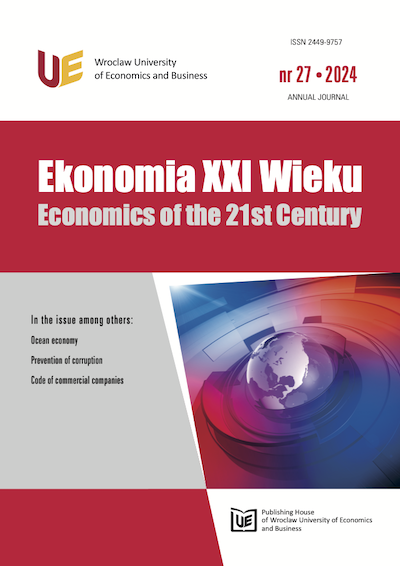Kraj pochodzenia w kontekście decyzji zakupowych konsumentówi zachowań producentów: przegląd literatury
DOI:
https://doi.org/10.15611/e21.2024.04Słowa kluczowe:
kraj pochodzenia produktu, efekt kraju pochodzenia, pochodzenie markiAbstrakt
Cel: W czasach globalizacji zagadnienie kraju pochodzenia produktu zyskało duże zainteresowanie ze względu na jego wpływ na zachowania konsumentów i strategie producentów. W artykule przedstawiono wymiary kraju pochodzenia produktu, jego efekty i wpływ na zachowania konsumentów i producentów na rynku.
Metodyka: Wykorzystując metodę PRISMA 2020, przeprowadzono systematyczny przegląd literatury w celu zidentyfikowania
odpowiednich badań, oceny ich ważności i przedstawienia wyników w ustrukturyzowany sposób.
Wyniki: W przeglądzie literatury ograniczono się do wybranych baz danych, wyszukiwanych haseł oraz kryteriów włączenia i wykluczenia. Podstawowymi źródłami były bazy WOS (Web of Science) i SCOPUS, z których zidentyfikowano 19 011 prac naukowych. Po zastosowaniu kryteriów kwalifikacyjnych wybrano 18 833 artykułów, a do odpowiedzi na pytania badawcze wykorzystano 75 artykułów pełnotekstowych.
Implikacje i rekomendacje: Naukowa dyskusja na temat kraju pochodzenia dostarcza różnorodnych spostrzeżeń i implikacji, podkreślając znaczenie zrozumienia przez sprzedawców czynników kształtujących wybory konsumentów dotyczące produktów wytwarzanych za granicą.
Oryginalność/wartość: Efekt kraju pochodzenia jest bardzo skomplikowanym, wielowymiarowym i wielowątkowym pojęciem, stąd wartością dodaną artykułu jest uporządkowanie terminologii i wiedzy z nim związanej, a także uporządkowanie i wskazanie na aspekty kraju pochodzenia produktu, które wpływają na decyzje zakupowe konsumentów oraz działania marketingowe przedsiębiorstw.
Pobrania
Bibliografia
Adaba, G. B., and Rusu, L. (2014). E‐trade Facilitation in Ghana: A Capability Approach Perspective. The Electronic Journal of Information Systems in Developing Countries, 63(1), 1-13. https://doi.org/10.1002/j.1681-4835.2014.tb00450.x
Balanabis, G., and Siamagka, N. T. (2017). Inconsistencies in the Behavioral Effects of Consumer Ethnocentrism: The Role of Brand, Product CateGory, and Country of Origin. International Marketing Review, 34(2), 166-182.
Barbarossa, C., De Pelsmacker, P., and Moons, I. (2018). Effects of Country-of-origin Stereotypes on Consumer Responses to Product-harm Crises. International Marketing Review, (35). https://doi.org/10.1108/IMR-06-2016-0122
Bartosik-Purgat, M. (2018). Country of Origin as a Determinant of Young Europeans’ Buying Attitudes – Marketing Implications. Oeconomia Copernicana, 9(1), 123-142. https://doi.org/10.24136/oc.2018.007
Beaudart, C., Silverman, S., Gold, D. T., Williams, S. A., Weiss, R., and Hiligsmann, M. (2022). A Qualitative Study to Assess US Patient Preferences between New Transdermal System and Injectable Anabolic Therapies for Osteoporosis Treatment. Archives of Osteoporosis, 17(1). https://doi.org/10.1007/s11657-022-01075-z
Bonroy, O., and Constantatos, C. (2015). On the Economics of Labels: How Their Introduction Affects the Functioning of Markets and the Welfare of All Participants. American Journal of Agricultural Economics, 97(1), 239-259.
Cavalheiro, C. S., Nakamoto, J. C., Wei, T. H., Sorrenti, L., and Wataya, E. Y. (2023). Histological Compatibility in Distal Neurotizations: A Systematic Review. Indian Journal of Plastic Surgery, 56(05), 405-412. https://doi.org/10.1055/s-0043-1774385
Chamorro, A., Rubio, S., and Miranda, F. J. (2015). The Region-of-Origin (ROO) Effect on Purchasing Preferences. British Food Journal, 117(2), 820-839. https://doi.org/10.1108/bfj-03-2014-0112
Charters, S., Spielmann, N., and Babin, B. J. (2017). The Nature and Value of Terroir Products. European Journal of Marketing, 51(4), 748-771.
Cristea, A., Gabriela, C., and Roxana-Denisa, S. (2015). Country-of-Origin Effects on Perceived Brand Positioning. Procedia Economics and Finance, (23), 422-427. https://doi.org/10.1016/S2212-5671(15)00383-4
De Mooj, M. (2013). Global Marketing and Advertising, Understanding Cultural Paradoxes. Sage Publications.
Deselnicu, O. C., Costanigro, M., Souza-Monteiro, D. M., and Thilmany McFadden, D. (2013). A Meta-Analysis of Geographical Indication Food Valuation Studies: What Drives the Premium for Origin-Based Labels? Journal of Agricultural and Resource Economics, (38), 204-219.
Herz, M., and Diamantopoulos, A. (2013). Country-Specific Associations Made by Consumers: A Dual-Coding Theory Perspective. Journal of International Marketing, 21(3).
Holden, A. C., and Rothenberger, S. (2010). Pricing Practices in Victorian America: Evidence from a Satirical Point of View. Journal of Product & Brand Management, 19(2), 135-142. https://doi.org/10.1108/10610421011033485 Fu, X., Liu, S., and Han, G. (2021). Supply Chain Partners’ Decisions with Heterogeneous Marketing Efforts Considering Consumer’s Perception of Quality. RAIRO – Operations Research, 55(5), 3227-3243. https://doi.org/10.1051/ro/2021126
Jimenez, N. H., and San Martin, S. (2010). The Role of Country-of-Origin, Ethnocentrism and Animosity in Promoting Consumer Trust. The Moderating Role of Familiarity. International Business Review, 19(1), 34-45. http://dx.doi.org/10.1016/j.ibusrev.2009.10.001
Kandogan, Y. (2019). Using Macro Cross‐border Trade Data to Better Understand Micro‐level Country of Origin Effects. Thunderbird International Business Review, (62). https://doi.org/10.1002/tie.22116
Kossyva, D., Theriou, G., Aggelidis, V., and Sarigiannidis, L. (2022). Definitions and Antecedents of Engagement: A Systematic Literature Review. Management Research Review, 46(5), 719-738. https://doi.org/10.1108/mrr-01-2021-0043
Laroche, M., Papadopoulos, N., Heslop, L. A., and Mourali, M. (2005). The Influence of Country Image Structure on Consumer Evaluations of Foreign Products. International Marketing Review, 22(1), 96-115. https://doi.org/10.1108/02651330510581190
Liberati, A., Altman, D. G., Tetzlaff, J., Mulrow, C. D., Gøtzsche, P. C., Ioannidis, J. P. A., and Moher, D. (2009). The Prisma Statement for Reporting Systematic Reviews and Meta-Analyses of Studies that Evaluate Health Care Interventions: Explanation and Elaboration. Journal of Clinical Epidemiology, 62(10), e1-e34. https://doi.org/10.1016/j.jclinepi.2009.06.006
Magnusson, P., and Westjohn, S. A. (2011). Is There a Country-of-Origin Theory? In S. C. Jain, D. A. Griffith (Eds.), Handbook of Research in International Marketing (pp. 292-316). Edward Elgar Publishing.
Page, M. J., McKenzie, J. E., Bossuyt, P. M., Boutron, I., Hoffmann, T. C., Mulrow, C. D., Shamseer, L., Tetzlaff, J. M., Akl, E. A., Brennan, S. E., Chou, R., Glanville, J., Grimshaw, J. M., Hróbjartsson, A., Lalu, M. M., Li, T., Loder, E. W., Mayo-Wilson, E., McDonald, S., McGuinness, L. A., Stewart, L. A., Thomas, J., Tricco, A. C., Welch, V. A., Whiting, P., and Moher, D. (2021). The Prisma 2020 Statement: An Updated Guideline for Reporting Systematic Reviews. BMJ, n71. https://doi.org/10.1136/bmj.n71
Raggio, R. D., Leone, R. P., and Black, W. C. (2014). Beyond “Hallo”: The Identification and Implications of Differential Brand Effects across Global Markets. Journal of Consumer Marketing, 31(2). https://doi.org/10.1108/JCM-06-2013-0592
Rufaidah, E. (2022). How Product Quality, Price and Service Quality Impact Customer Satisfaction? Case Study at Son Hajisony Meatball. Economic Education and Entrepreneurship Journal, 5(1), 23-34. https://doi.org/10.23960/e3j/v5i1.23-34
Sharma, P. (2011). Demystifying Cultural Differences in Country-of-Origin Effects: Exploring the Moderating Roles of Product Type, Consumption Context, and Involvement. Journal of International Consumer Marketing, (23), 344-364. https://doi. org/10.1080/08961530.2011.602952
Sharma, P. (2015). Consumer Ethnocentrism: Reconceptualization and Cross-cultural Validation. Journal of International Business Studies, 46(3), 381-389.
Sliburyte, L., and Bankauskiene, G. (2017). An Empirical Study on the Impact of Country of Origin Effect on Young Lithuanian Consumers’ Attitude towards Products. Engineering Economics, (28). https://doi.org/10.5755/j01.ee.28.4.17535
Tjandra, N., Omar, M., and Ensor, J. (2015). Advanced and Emerging Economies Generation Y’s Perception Towards Country-of-origin. International Journal of Emerging Markets, (10), 858-874. https://doi.org/10.1108/IJoEM-11-2012-0146
Vranesevic, T., Pušić, A., and Mandić, M. (2024). Advancing Brand Origin Concept through the Reverse Country of Origin Effect: The Case of Generation Z. Ekonomski Pregled, (75), 32-61. https://doi.org/10.32910/ep.75.1.2
Witek-Hajduk, M., and Grudecka, A. (2019). Country of Origin from a Management Perspective of Emerging Market Companies. International Journal of Management and Economics, (55). https://doi.org/10.2478/ijme-2019-0015
Yu, C. C., Lin, P. J., and Chen, C. S. (2013). How Brand Image, Country of Origin, and Self-Congruity Influence Internet Users’ Purchase Intention. Social Behaviour and Personality: An International Journal, 41(4), 599-611. https://doi.org/10.2224/sbp.2013.41.4.599
Xu, H., Leung, A., and Yan, R. N. (2013). It Is Nice to Be Important, But It Is More Important to Be Nice: Country-of-Origin’s Perceived Warmth in Product Failures. Journal of Consumer Behaviour, 12(4), 285-292.








